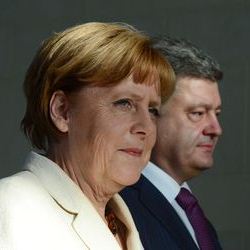The most persistent component of a variety of Russian pro-Kremlin discourses is its mimicry and imitation of the West. This was so in the 1990s and it still remains the case under the drastically changed conditions of the crisis in Ukraine.
I had a chance to see how this mimicking works at a recent conference of the International Geographical Union (IGU) held in Krakow. Two young scholars from the Russian Academy of Science made presentations on Russia’s border issues and neighbor-state policies. The main argument was that Russia is open to the idea of “soft borders” that evidently has a European intellectual pedigree, yet faces difficulties in dealing with – if not resistance from – its western neighbors. The Russian presenters, in particular, ridiculed the idea of fortifying the border between Ukraine and Russia, claiming that in some cases it may go through towns located on both sides of the border, splitting them apart.
A simple remark from the audience – “Yet Ukrainians want to protect themselves against the ongoing encroachment from Russia, don't they?” – perplexed the Russian speakers. Surprisingly, their seemingly liberal appeal to “make borders more humane and less restrictive” – completely ignored the dominating pressure of security considerations that define the whole context of Russia-Ukraine relations. Instead, they preferred to explicate today's realities using the explanatory tools from the “normal times” that preceded the current crisis.
Of course, one may claim that this was done due to academic imperfection. Nevertheless, I see in this argument a deliberate attempt to sustain, academically, the Kremlin's hegemonic discourse.
The logic of Kremlin loyalists – meant basically for international audiences – starts with removing all references and mentions about economic sanctions from of any possible causal context. In other words, these types of Kremlin-friendly discourse notice no cause-and-effect between Russia's policy in Ukraine and reactions to it from the West. For example, it bypasses taking into account the negative domestic effects of the Russia-imposed ban on European foods items.
And the discursive mimicry kicks in further: Western sanctions are declared ineffective on the basis of interdependence – a concept with an explicit Western legacy. Paradoxically, Russia, which is becoming increasingly isolationist and inimical to major global institutions (NATO, WTO, European Court of Human Rights, etc.), nevertheless explores the rhetoric of global interdependence to get greater immunity from being sanctioned for misconduct.
Further, as evidenced by the presentation of the young Russian colleagues in Krakow, the mainstream, Kremlin-compatible, academic discourse does its best to claim Russia's allegiance to the idea of “soft” borders, serving to unite neighbors rather than divide them. The politically instrumental meaning of this argument – again based on a strong Western academic tradition – becomes evident in the case of Ukraine: soft, if not open, borders between Russia and Ukraine are evidently tantamount to producing greater space for Russian maneuvering (if not freedom to breach Ukraine's territorial integrity).
And then there is the federalist argument, strongly promoted by Moscow in Ukraine, which is another loan concept conceived in the West. Those who still see causal links between what Russia claims internationally and what is does domestically comprehend the importance of portraying Russia as a federation (at least formally). This explains the characterization of Kaliningrad by the young Russian scholars as “a self-governing region with a strong federal presence” – an intentionally over-optimistic reading of what actually is Russian federalism. Of course, one may keep reiterating that Russia is a federation of “self-governing” regions, yet how would one explain in this context that the recent public “March for federalization” in Novosibirsk was scattered by the police?
With these examples in mind, we see that Russia is learning how to utilize – for the sake of the Kremlin’s deeply anti-Western policies – the liberal concepts of human security, humanitarian intervention, and decentralization. However, this discursive mimicry does not add much to bridging perceptional gaps between Russia and Ukraine that are marked by increasing alienation and estrangement. Russia's attempts of claiming the existence of a historical and cultural kinship between the two countries not only meets resistance from Ukraine, but also reveals the lack of any understanding by either side of each other’s underlying motives.
For Ukraine, as well as for most Western countries, it is hard to comprehend why the biggest country in the world is looking for more territory, and would risk important economic aspects to pursue territorial expansion. What lacks from the Russian side is comprehending Ukraine’s unease of living next door to Russia, which is not disguised by its use of Western rhetorical decorations.











